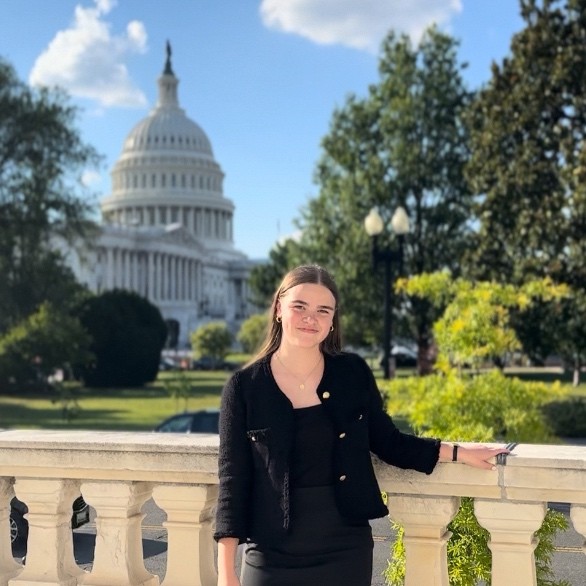 This past summer, I joined fifty other high-school girls in Washington D.C., each of us selected for an intensive political training program. Together, we sat in a conference hall at the heart of the city, awaiting the start of our program—one that promised to equip us with the skills to run for political office.
This past summer, I joined fifty other high-school girls in Washington D.C., each of us selected for an intensive political training program. Together, we sat in a conference hall at the heart of the city, awaiting the start of our program—one that promised to equip us with the skills to run for political office.
A female executive at the organization stepped onto the stage and the chatter ceased. She began, “No matter how you may feel, every person in this room belongs here.” She paused, locking eyes with each of us. “You belong here.”
Her words were simple, yet powerful. What remained unspoken upon arrival were the doubts we carried with us. Despite being selected for the program, based on our applications that proved our abilities, many of us, as I later learned from talking with my peers, still felt a shaky belief in our place there.
My cohort was filled with high achievers: girls who had published books, chaired boards, represented organizations as youth ambassadors, and received grants to pursue their passions. Yet, these silent fears of inadequacy threaten to undermine us. This is not a disposition isolated to high school girls, but research shows it is exacerbated within our demographic. Her words, then, were more than an encouragement. They were an affirmation of our right to a seat at the table—both figuratively and literally. This is the importance of fostering confidence and resilience in the next generation of female leaders. It is what equips us to navigate and succeed in a complex world.
As a Rhode Island high-school student finishing my sophomore year, I found this program after searching for summer opportunities to further pursue my passions. The training was offered by Running Start, a nonpartisan nonprofit dedicated to this goal of training the next generation of female political leaders. I was thrilled to be accepted.
The days we spent in D.C. were filled with trainings, tours of Capitol Hill, meetings with our state’s elected officials, and hands-on activities designed to build our confidence and competence. We learned about campaign strategies, public speaking, and policymaking, guided by professionals who had once been in our shoes. Before the start of the program, we were divided into campaign teams with roles assigned at random. At the end of the program, we would compete in a mock election against other teams, voted on by experienced professionals, including leaders in their fields and former congresswomen. I was happy to be selected as the candidate for our campaign simulation. This meant I would be the face of the campaign, delivering our stump speech, showing our campaign ad, and presenting our social media on the day of the election.
The whole experience was invigorating. While on Capitol Hill, I met with my district’s Representative, Seth Magaziner, discussed policy with senatorial staffers, and sat in on a heated congressional hearing centered on racial diversity in the workplace. On multiple occasions, I spoke to audiences about what I most cared about, such as advocating for universal pre-K to empower women and reduce educational disparities. I had never before felt so engaged and inspired. I had never before walked into rooms with such a strong sense of purpose and confidence. Each interaction reinforced the idea that the program aimed to instill: we have a rightful place in the political arena, and our perspectives are essential.
However, this program wasn’t just about networking or running for office. Regardless of our goals, public office or not, each of us left with something profound: a newfound confidence in our capabilities as young women. It was an incredibly uplifting experience, and I wish every girl could experience the same at this age. The issue, however, is that few are aware that these sorts of resources exist. If you are a high school student with similar interests, I encourage you to apply to the program I attended offered by Running Start. They offer considerable financial aid, and as they are an organization not seeking a profit, you can rest assured that they aim to make it as accessible as possible.
Through the training, the most valuable lesson I learned was about the nature of personal growth. It's crucial for young women and their mentors to recognize this: the traits of a leader—confidence, resilience, and many others—are not immutable, set at birth or sometime in childhood, never to be changed. Instead, they are developed, mined from an imperfect surface. To sculpt a generation of leaders, especially young women, we must first provide the tools. Beneath the stone, the sculpture—the potential within every girl—has always existed. But we do not expect the sculptor to claw through marble with her bare hands. Instead, we must provide the chisel, the tools necessary to find and form the skills that will lead her to greatness.
These tools are not limited to the sort of program I attended. They are provided through mentorships, academic or career opportunities, educational resources, or something as simple as a conversation. To encourage girls to be more civically minded, we must first assure them that they have an impact, and that they are capable. This is the result of those affirmations like the one spoken on our first day of training. We held her words in our minds long after we left: “You belong here.” And indeed, we do.

